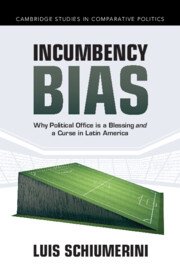
- Coming soon
- Publisher:
- Cambridge University Press
- Expected online publication date:
- June 2025
- Print publication year:
- 2025
- Online ISBN:
- 9781009636490

The conventional wisdom in political science is that incumbency provides politicians with a massive electoral advantage. This assumption has been challenged by the recent anti-incumbent cycle. When is incumbency a blessing for politicians and when is it a curse? Incumbency Bias offers a unified theory that argues that democratic institutions will make incumbency a blessing or curse by shaping the alignment between citizens' expectations of incumbent performance and incumbents' capacity to deliver. This argument is tested through a comparative investigation of incumbency bias in Brazil, Argentina and Chile that draws on extensive fieldwork and an impressive array of experimental and observational evidence. Incumbency Bias demonstrates that rather than clientelistic or corrupt elites compromising accountability, democracy can generate an uneven playing field if citizens demand good governance but have limited information. While focused on Latin America, this book carries broader lessons for understanding the electoral returns to office around the world.
‘Incumbency was once believed to yield an overwhelming advantage in Latin America. But today, at least in parts of Latin America, incumbents are being thrown out like never before. In this pathbreaking study, Luis Schiumerini offers a compelling new framework to understand why incumbents succeed or fail. Drawing on impressive research, Incumbency Bias shows why incumbency continues to benefit politicians in some contexts but undermines them in others. This is, by far, the best book I have read on the comparative politics of incumbency. A must-read for anyone who studies-or cares about-electoral politics in Latin America.'
Steven Levitsky - David Rockefeller Professor of Latin American Studies, Professor of Government and Director of the David Rockefeller Center for Latin American Studies, Harvard University
‘Political bias due to incumbency occurs all over the world, not just in the United States. But it is a complicated thing. Politicians or parties running to stay in office can either be helped or hurt by their status of incumbency. In this skillful analysis, Luis Schiumerini shows the ins and outs of the matter in Latin America.'
David R. Mayhew - Sterling Professor of Political Science Emeritus, Yale University
‘Incumbency Bias offers a novel twist on a long-established assumption, that politicians benefit from being in office. Instead of an incumbency advantage, in some contexts politicians suffer from an incumbency disadvantage – not because they performed poorly, but because voters in some contexts “expect too much” of their elected officials, and thus punish them ‘excessively' at the ballot box.'
David Samuels - Distinguished McKnight University Professor, University of Minnesota
‘Why are incumbent mayors more likely to lose re-election in Brazil but win it in Argentina? Why is the electoral playing field skewed against the opposition in some countries and against the government in others? We often deceive ourselves by assuming that political performance operates in equilibrium-where good governance is rewarded, and bad governance is punished. But what happens when all local incumbents are either flooded with resources or deprived of them? In his groundbreaking study, Luis Schiumerini reveals that, in low-information environments, incumbents' performance rarely reaches equilibrium. Retrospective voting can be overly lenient toward those in power-or, at times, far too harsh.'
Ernesto Calvo - Professor of Government and Politics, University of Maryland
 Loading metrics...
Loading metrics...
* Views captured on Cambridge Core between #date#. This data will be updated every 24 hours.
Usage data cannot currently be displayed.